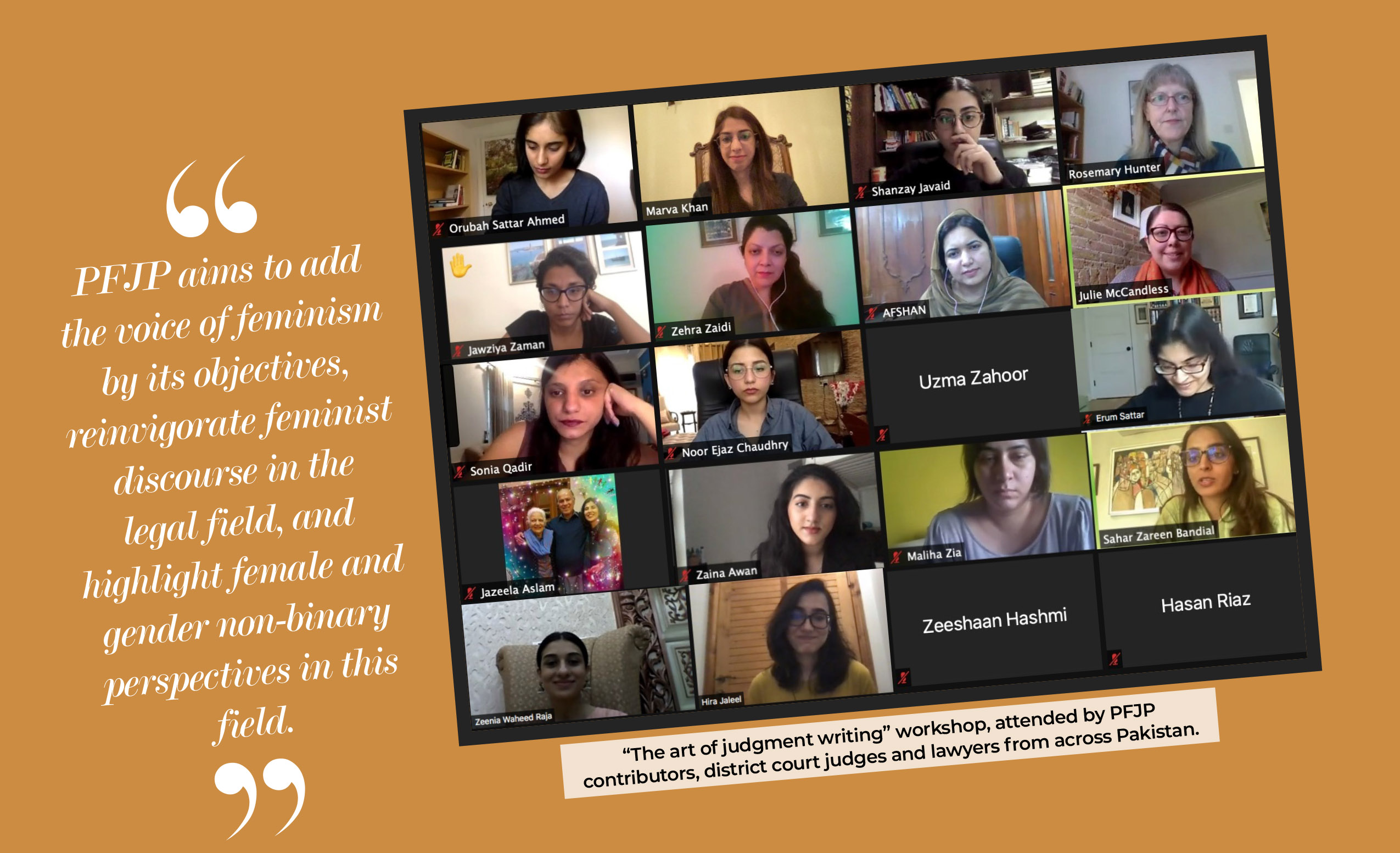
We founded the Pakistani Feminist Judgments Project (PFJP) with the aim to write alternative judgments for Supreme Court cases, from a feminist legal perspective. The idea behind PFJP is to envisage the different outcomes of various important Supreme Court cases, had a feminist judge written the judgments. Our project aims to add the voice of feminism by its objectives,reinvigorate feminist discourse in the legal field, and highlight female and gender non-binary perspectives in this field.
The PFJP is inspired by the Feminist Judgments Projects conducted and initiated in Canada, United Kingdom, United States, New Zealand, Australia, Scotland, Ireland, South Africa, and India to bring together women academics, practicing lawyers, judges and legal researchers to rewrite alternative feminist judgments in significant legal cases. It aims to highlight how the judicial jurisprudence could have practically changed if the cases had been written or decided from a feminist perspective.
All feminist “judges”, while writing their judgments, will be bound by the same ethical and legal constraints, precedents, and laws that bind real life judges. They can choose to write dissents, concurrences, or agree with the majority. Each re-written judgment will also be accompanied by a commentary which will contextualize the original judgment, discuss why a feminist re-write was essential, and evaluate the rewritten judgment in this context. These re-written judgments and commentaries shall be published in the form of a book. This exercise of developing feminist jurisprudence through re-writing Supreme Court Judgments is especially necessary in Pakistan - a country where not even a female judge has ever been raised to the Supreme Court, let alone any gender diverse or non-binary person.

One of the judgments being re-written is the much-lauded Shehla Zia v WAPDA PLD 1994 SC 693. The petitioner, Ms. Shehla Zia, was one of the most notable women lawyers in Pakistan’s history, and was also one of the founding members of Pakistan’s first all-woman law firm. However, the judgment is absolutely silent about the petitioner, and fails to address the hazardous effects of an unhealthy environment on female mortality and maternal health – issues which will be addressed by the re-written judgment. The rewritten judgment will also bring in more nuanced arguments, including how environmental factors impacts different classes (in this case, the residents of a nearby dhobi ghat did not have access to same resources as the F6 residents in Islamabad). Similarly, since economic development is a key factor behind many projects detrimental to the environment, the Project will also attempt to devise an inclusive definition of economic development.
The Feminist Judgment Projects in other parts of the world have resulted in re-opening of closed cases, being used as guiding tools for adjudication, and also used as teaching material in law schools around the world.
The “judges” rewriting these judgements are lawyers, academics, legal research scholars and subject experts from various professions. For the benefit of the authors and commentators, the PFJP conducted a series of online workshops. The first one titled “The Art of Judgment Writing” was held on March 27, 2021. In addition to the authors and commentators, this workshop was opened to the public at large and was very well attended. Attendees included members of the district judiciary, lawyers, and academics. Two other workshops on Environmental law and Criminal Law were also conducted for our contributors. Another three thematic workshops on discrimination law, family law, and mobility and economics were conducted on April 10, 2021.
Our workshops and the eventual book publication aim to enhance legal discourse in the country. By providing templates incorporating the elements of feminism, equality, and justice within the rewritten judgments, these will be helpful for judges, lawyers, and students alike. The Feminist Judgment Projects in other parts of the world have resulted in re-opening of closed cases, being used as guiding tools for adjudication, and also used as teaching material in law schools around the world. With the first ever PFJP, we are excited to see this project’s impact in Pakistan and future editions of the same project.
Marva Khan is Assistant Professor of Practice at the Shaikh Ahmad Hassan School of Law at LUMS. She holds an LL.M degree from Harvard Law School. Her main areas of research interest include comparative constitutional law, and particularly its overlap with human rights.
Orubah Sattar is Adjunct Faculty at the Shaikh Ahmad Hassan School of Law at LUMS.
